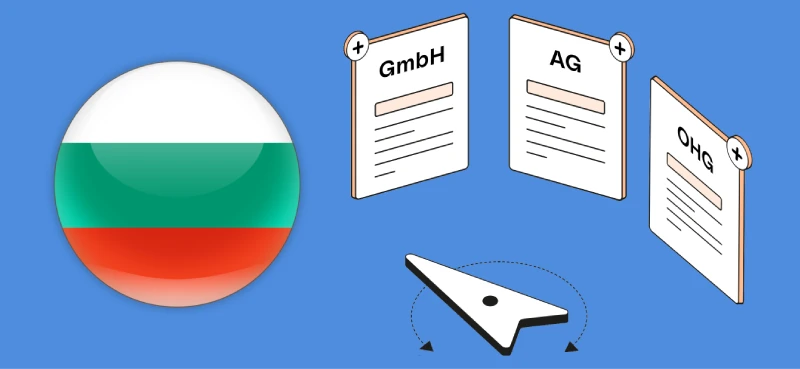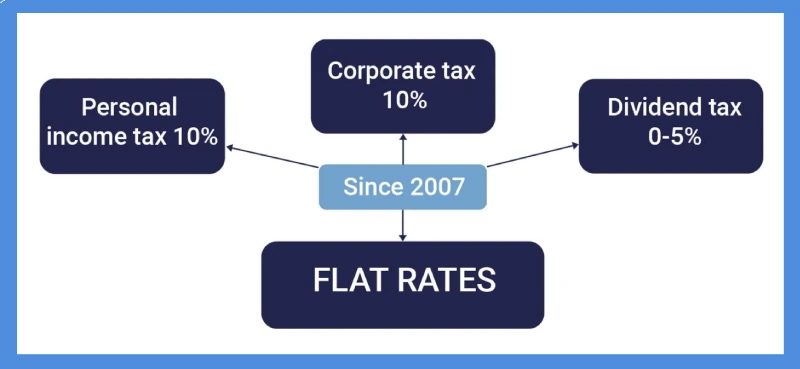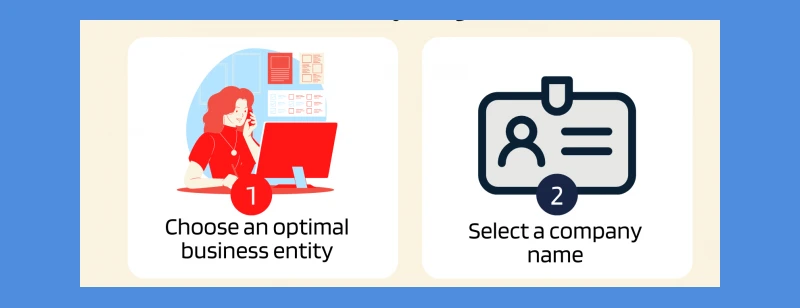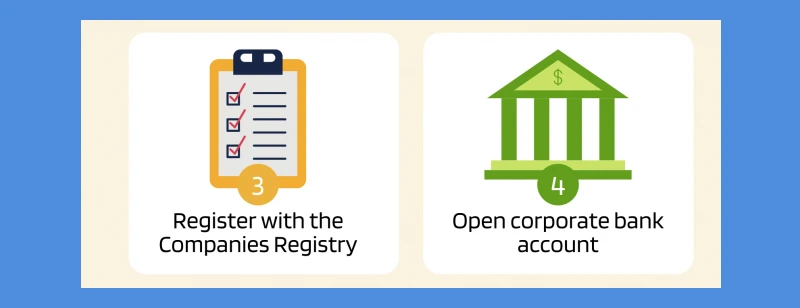email: info(at)go-eu.com
phone: +49 (0)89 90 42 23 60



assisted in a company setup.

Table of contents:
1.) 5 Steps: Company formation Bulgaria
2.) Costs
3.) TOP 3 Advantages
4.) TOP 3 Disadvantages
5.) Our office locations
1.) Register a company Bulgaria in 5 steps
12 February 2026 18988 14Step 1: Choose a company type
Before starting a business, the first question to be asked is: What types of companies are there? And what are the economic and tax implications of each?
Residence in your home country or in Bulgaria - which type of company should you choose?

Private companies such as general partnerships, limited partnerships or sole proprietorships require a residence in Bulgaria and trigger a social security tax in addition to the corporate tax - an added cost that is far from negligible!
For founders with residence outside Bulgaria only a LLC (Bulgarian OOD / EOOD) or Incorporation (Bulgarian AD) comes into question.
The LLC is called OOD or EOOD in Bulgaria. This Bulgarian version of the Limited Liability Company has a clear and adaptable organizational structure. It is also suitable for small and medium-sized companies that prefer limited liability and a straightforward organizational structure.

The OOD requires a written partnership agreement that does not require a notarial certificate. In comparison to the establishment of a Limited Liability Company, the
share capital of EUR 1 is almost irrelevant. There are certain special situations of the OOD for which special regulations apply. Particularly worth mentioning is the
one-person limited liability company (EOOD). The EOOD can be founded by just one person (one-man LLC) and is therefore supplemented with the letter E.
Step 2: Why Bulgaria
With just 10% income and corporate tax, Bulgaria has the lowest tax rate in Europe, along with Romania. This makes setting up a company in Bulgaria the tax haven in the EU.

Low labor costs: Compared to most Western European countries, Bulgaria is convincing due to its low labor costs. Bulgaria is an ideal alternative location for your company if you are looking for highly qualified personnel but lack the budget for workers from more expensive countries. This is especially true for the production and IT sectors.
Stable tax policy: A stable and consistent tax policy: Bulgaria has a solid tax policy. This helps to provide confidence to companies planning long-term investments and depending on a predictable tax environment.
Low cost of living: If you are not only thinking about running your company in Bulgaria but also want to live in the country, you will benefit from low living costs.
➼ Further information:
➔ Latest Taxes in Bulgaria: Tax Rates 2026➔ Business Bulgaria: Business as a foreigner
➔ Accounting Bulgaria: Accounting Services Bulgaria
➔ EOOD Bulgaria: EOOD Bulgaria
Step 3: Requirements for founding a business
In order to establish a corporation in the form of an OOD, the following questions arise: Is it possible to establish a company without having to travel? What documents must be submitted?
The OOD/EOOD must be notarized - do I have to go to a notary in my home country or even in BG?

Starting a business remotely, without having to travel at all, is often not entirely possible! - But with GO EU it is definitely possible!
Many providers promise to set up a company without any local notary appointment. In reality, a notary appointment in the country of residence is often necessary. The notarized documents then have to be provided with an apostille, which is a laborious process.
Upon opening a bank account or authorizing the tax advisor, a physical notary appointment on site is required, contrary to what was previously promised!
--> Exclusively at GO EU - Company formation, account opening and tax advisor authorization 100% remote and without physical notary appointment possible!
We answer all your questions about a company setup Bulgaria – free of charge and without obligation.
Inquire now
Over 500 successful foundings. Answer in 24h.
Or give us a call: +49 (0)89 90 42 23 60
(NEW: Company formation including bank account opening 100% remote)
Company Formation Process
- The share capital must be at least 2 leva (1 euro).
- Payment of the Share Capital
- Articles of association authorised by a lawyer / notary
- Checking and applying for the Company Name
- Preparation of the formation documents
- Registration in the Bulgarian Commercial Register
- Notarial certification

Required information:
- Determine the amount of share capital
- Specify the company's object and business purposes
- Allocate shareholder shares
- Establish the company's registered office
- Define the Rights and Obligations of the Shareholders
2.) Costs / Prices
The prices for setting up a company depend on a number of factors. Are there additional costs for travelling to Bulgaria for company registration or opening a bank account? In the best case scenario, no travel is necessary at all and all services can be carried out 100% remotely. The costs for setting up a company are around EUR 1,000 - 1,500. The costs of establishing a company with GO EU include:
- ✅ Complete remote incorporation
- ✅ Founding & Name Registration
- ✅ Lawyer & notary fees included
- ✅ Commercial register entry
- ✅ Receive original certificate of incorporation
- ✅ VAT ID, Bank Account Opening remotely
- ✅ Support from English-speaking employees
- ✅ Own Bulgarian accountants
Establishment & account only with GO EU 100% remote! - But what additional costs are there?

We answer all your questions about a company setup Bulgaria – free of charge and without obligation.
Inquire now
Over 500 successful foundings. Answer in 24h.
Or give us a call: +49 (0)89 90 42 23 60
(NEW: Company formation including bank account opening 100% remote)
Additional costs: Company address (including mail forwarding), application for VAT ID, bank account opening, and expenses for monthly accounting and annual financial statements.
Attention: Tax consultant fees are often expensive as in Eastern European countries such as Bulgaria a lot of accounting is still done manually.
Accounting costs average from 250 EUR per month plus annual financial statements.
Attention: Even poorly trained lawyers or large tax firms—where reaching someone in urgent situations is often difficult—charge these prices.
--> Exclusively at GO EU - Access to our own tax advisors and English-speaking employees included at a fixed price! (Costs well under 250 EUR per month)
Step 4 and 5: Choosing the right company formation agency and structure
Self-employed people and entrepreneurs benefit from the advantages of setting up a company in Bulgaria, including a low corporate tax rate of just 10%, low wages and a stable tax policy. The economic opportunities and the geographical proximity to the European market, despite bureaucratic obstacles, language barriers and cultural differences, make Bulgaria an extremely attractive location with the help of the right local partner.

We answer all your questions about a company setup Bulgaria – free of charge and without obligation.
Inquire now
Over 500 successful foundings. Answer in 24h.
Or give us a call: +49 (0)89 90 42 23 60
(NEW: Company formation including bank account opening 100% remote)
3.) TOP 3 Advantages: Starting a company in Bulgaria
Over a year ago, we talked about the 3 biggest disadvantages of starting a company in Bulgaria in a video. The main disadvantages were: With a tax burden of 10% on profits, nothing can be deducted, and opening an account for foreigners without a residence in Bulgaria was almost impossible.
It is 2026. What has changed? We would like to share with you the TOP 3 advantages of why it can make sense to set up a company in Bulgaria.
1. Taxes under 10% possible!
Bulgaria has a very simple tax system. 10% flat tax for everyone! This is a 10% tax on profits. Expenses outside Bulgaria are unfortunately not recognized as deductible or for reducing taxable profits, making it almost comparable to a 10% income tax.
But here comes the big advantage of GO EU!
We have specialized in Romania and Bulgaria and have permanent employees on-site. We also have our own tax consultants and operate as a family-run business. Their sons are part of our accounting team.

Based on this expertise, we have created a setup that allows us to request a corporate tax rate of 7.5% instead of 10% from the tax authorities for newly founded companies in Bulgaria. And it is completely legal and can be implemented by almost anyone via GO EU!
2. Bank account openings significantly improved from 2026
Bulgaria is always at the bottom of the list in the EU. The banking system was outdated for years, as was the possibility of opening an account for foreigners or for people living outside Bulgaria. This has improved dramatically: It has been possible to open an account with direct banks such as Revolut, and many more for some time now.

Nevertheless, the process is very complex and many Bulgarian tax advisors approach it incorrectly - so that the bank account opening fails in the end. At GO EU, we can almost guarantee a bank account for company founders and also support them throughout the entire process.
3. No need to hire employees
In neighboring Romania, there are micro-enterprises with a tax burden on turnover of 1-3% up to an annual turnover of 500,000 euros. A key requirement for this is hiring an employee, though you can also employ yourself, with a minimum gross salary of 700 euros. In Bulgaria, however, this is not necessary to qualify for a different tax category—the tax rate remains the same.

I hope you enjoyed this blog post. If the topic of setting up a company in Bulgaria or saving taxes is of interest to you, we look forward to hearing from you.
We answer all your questions about a company setup Bulgaria – free of charge and without obligation.
Inquire now
Over 500 successful foundings. Answer in 24h.
Or give us a call: +49 (0)89 90 42 23 60
(NEW: Company formation including bank account opening 100% remote)
Starting a company in Bulgaria on your own and without help is often difficult to achieve
At first glance, Bulgaria sounds like an emigration paradise and tax haven. The lowest cost of living in the EU, low taxes and proximity to the sea.
But be careful, there are some disadvantages that can become obstacles when emigrating and often when starting a business.. We will explain!
The advantages of Bulgaria at a glance:
4.) TOP 3 Disadvantages of starting a company in Bulgaria:
1. Flat Tax 10% - expenses are mostly not deductible
In Bulgaria, a general tax rate of 10% applies. It does not matter whether you are establishing a company such as a Bulgarian Limited Liability Company or a natural person such as a freelancer. Only 10% tax is always paid on profits. That sounds fair and tempting. Of course, the aim should be to offset or deduct as much as possible in order to reduce profits and, conversely, pay less tax. Unfortunately, there is a big catch: ordinary expenses such as office rent, salaries, office ancillary costs, internet, etc. can be deducted from taxes.

However, essential expenses such as advertising costs, company vehicles, consulting expenses, as well as the majority of expenses incurred outside Bulgaria, cannot be deducted from taxes. They therefore do not reduce profits.
Since only expenses related to maintaining a physical office can generally be deducted, a company in Bulgaria is rather unsuitable for digital nomads, frequent travelers or commuters.
Even more serious is the registration in Bulgaria as a self-employed person. In this case, when setting up a sole proprietorship, i.e. not a company, no costs can be deducted - i.e. the 10% is like a tax on sales. If you earn 200,000 EUR, you pay 20,000 EUR in taxes (10%).
2. Bank account Bulgaria
The days are long gone when Western Europeans could cross the border into Bulgaria and simply open bank accounts there – especially without a physical residential address or primary residence in the country.

There are currently a number of company formation agencies that support founders or expats in setting up a company in Bulgaria - however, there is no indication anywhere that opening a bank account with a Bulgarian bank is difficult. This is similar to Cyprus. Even direct banks such as Transferwise or Revolut have denied Cyprus access, i.e. a bank account for the country of Cyprus can no longer be opened with these providers. The situation is similar for Bulgaria with its national banks, as well as with an increasing number of direct banks.
3. Rule of law, Language and Writing
However, the rule of law and transparency are still the biggest problem areas in Bulgaria. The European Union has therefore repeatedly warned Bulgaria about inadequate anti-corruption measures. The EU Commission is therefore demanding clear control mechanisms from the Bulgarian government, otherwise further funds from the EU could be blocked. It’s the same old narrative, but still as relevant as ever. One must not forget: Bulgaria is the poorest country in the EU, and it is struggling with the biggest social problems.

Bulgaria is completely different from other countries in terms of language and writing. The Bulgarian language does not use the Latin alphabet, but the Cyrillic alphabet. Additionally, there are many regional dialects. Learning the language is extremely difficult, especially since the Bulgarians' knowledge of English leaves much to be desired. In the capital Sofia, you can communicate reasonably well.
Our office in Bulgaria
➼ More Information:
➔ About us: The Team behind GO EU➔ Contact: Contact and Locations

Company headquarters in Bulgaria
GO EU Services
10 Kapitan Lietenant Evstati Vinarov St.
7000 Ruse
Floor 2
Bulgaria
Internet: https://www.go-eu.com
email: info (at) go-eu.com
phone DE: +49 (0)89 90 42 23 60
phone RO: +40 (0)758 475 461
➼ Further information:
➔ Latest Taxes in Bulgaria: Tax Rates 2026➔ Business Bulgaria: Business as a foreigner
➔ Accounting Bulgaria: Accounting Services Bulgaria
➔ EOOD Bulgaria: EOOD Bulgaria
We answer all your questions about a company setup Bulgaria – free of charge and without obligation.
Inquire now
Over 500 successful foundings. Answer in 24h.
Or give us a call: +49 (0)89 90 42 23 60
(NEW: Company formation including bank account opening 100% remote)

Valentin Burgstaller
Published on 20 October, 2022 / Answer
I was about to start a company in Bulgaria. That might sound like flattery or something. I have no connection to the operators here nor have any ties to them. However, luckily I was able to avoid Bulgaria and so far I am very happy with my Romanian company. Thanks to the team!
Lorenz
Published on 20 October, 2022 / Answer
What if I don’t want to emigrate to Bulgaria or Romania?
Theodor M.
Published on 21 October, 2022 / Answer
I would be interested in that too. I plan to stay in Germany and don't want to emigrate. Is it even possible to run the company without problems with the tax office?
Thomas Hofmann
Published on 21 October, 2022 / Answer
Setting up a company within the EU is a normal process and happens a lot every day - even if the founder's main place of residence is not in the country of establishment - but in the home country. Setting up a company is not a problem. In terms of tax recognition by the local tax office, it should be noted that the whole thing is based on the double taxation agreement. If its guidelines are complied with, recognition is guaranteed. This procedure is implemented in exactly the same way by hundreds of thousands of companies. A normal process and not a grey area.
Patrick Gerstner
Published on 22 October, 2022 / Answer
I am interested in starting a company or getting advice. Can I just call?
Thomas Hofmann
Published on 22 October, 2022 / Answer
You can reach us by phone every weekday during regular office hours. We are always happy when someone calls us directly. An initial consultation including advice is always free of charge.
Leopold Dittler
Published on 23 July, 2023 / Answer
I haven't been able to get a bank account in Bulgaria as a foreigner for 3 months. According to a friend, it's very easy in Romania. Do you know more?
Jochen Pfeil
Published on 14 September, 2024 / Answer
Companies and private individuals can get a bank account in Bulgaria if they do not emigrate to Bulgaria. It does not matter whether it is a local bank or a direct bank such as Revovult or Wise. No residence in Bulgaria? No problem—an account is still possible!
Hanjo
Published on 15 January, 2025 / Answer
The Black Sea coast is a wonderful place to live! I only have my pension, but maybe that will change with a BG company. Import German sausage products and sell them here.
Oscar
Published on 15 March, 2025 / Answer
Not being able to deduct expenses outside Bulgaria is a real drawback for me..
Philippo
Published on 03 July, 2025 / Answer
You can deduct it, all my flights and hotel stays could have been deducted on my EOOD
Godman
Published on 23 October, 2025 / Answer
This year or better for next year to move to Bulgaria. Does it make a difference?
Joshua
Published on 03 December, 2025 / Answer
Bulgaria stay strong and keep up with those protests!
Cosmetica
Published on 10 February, 2026 / Answer
Bulgaria is the nr in Europe for low taxes!
Leave a comment